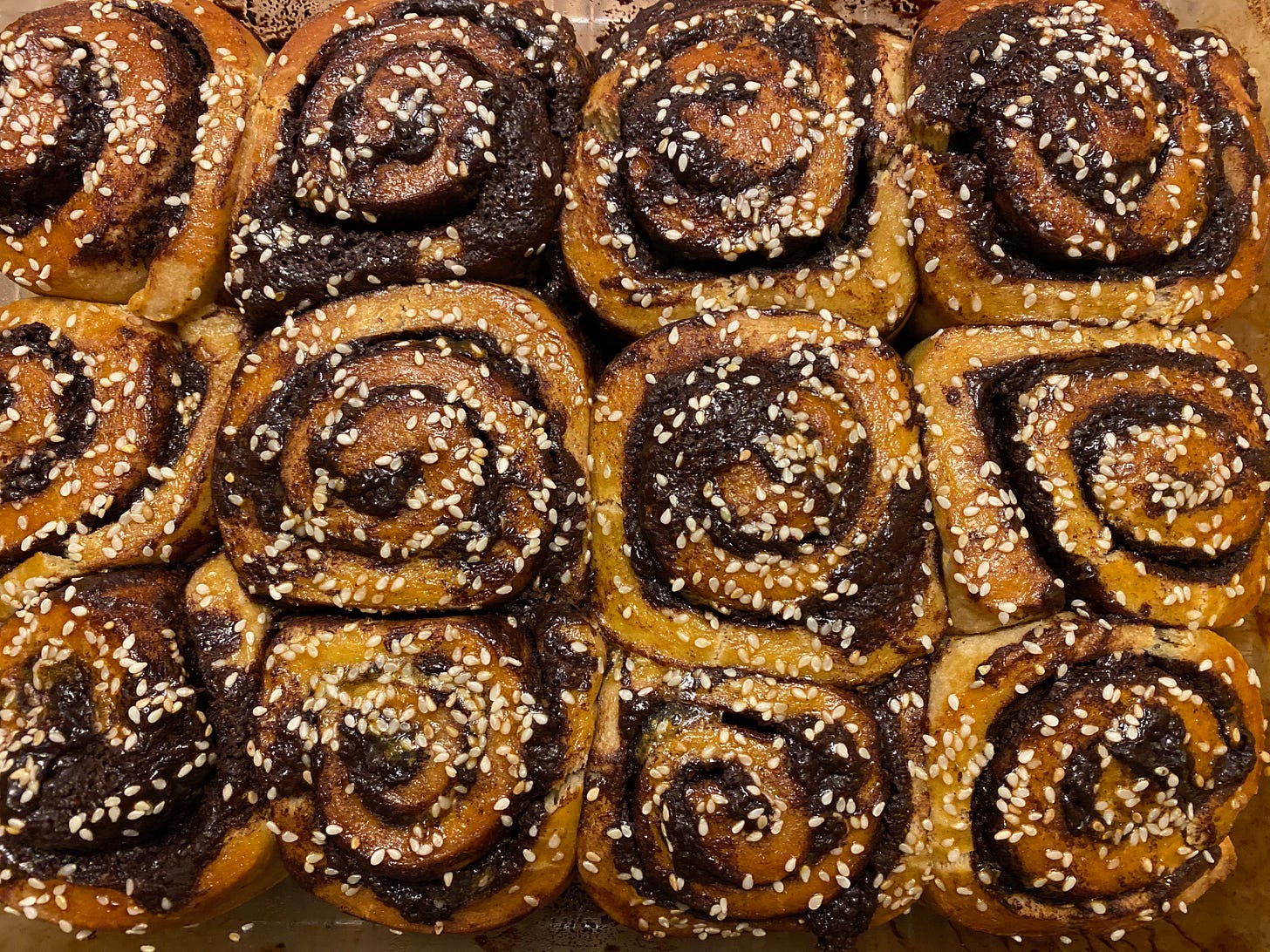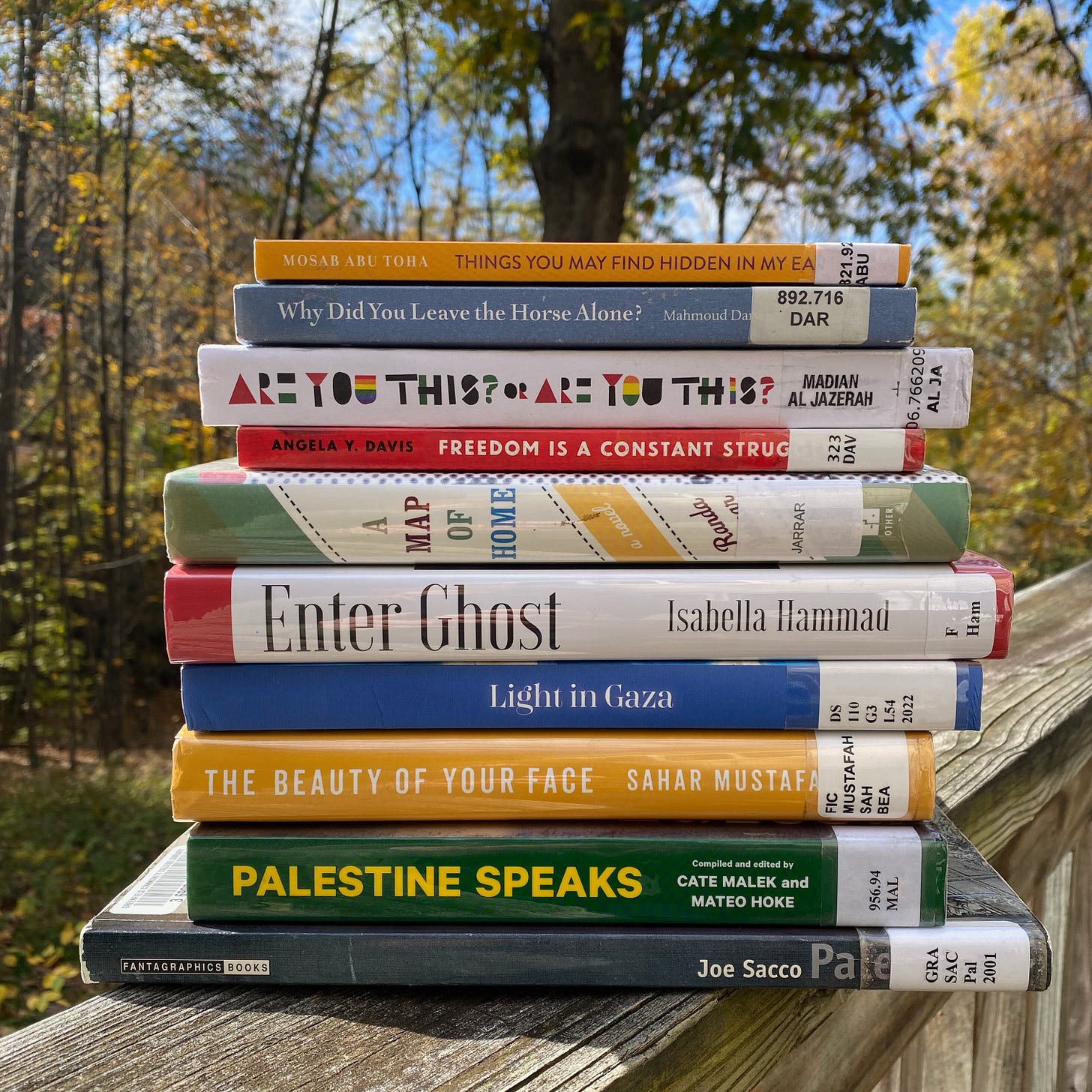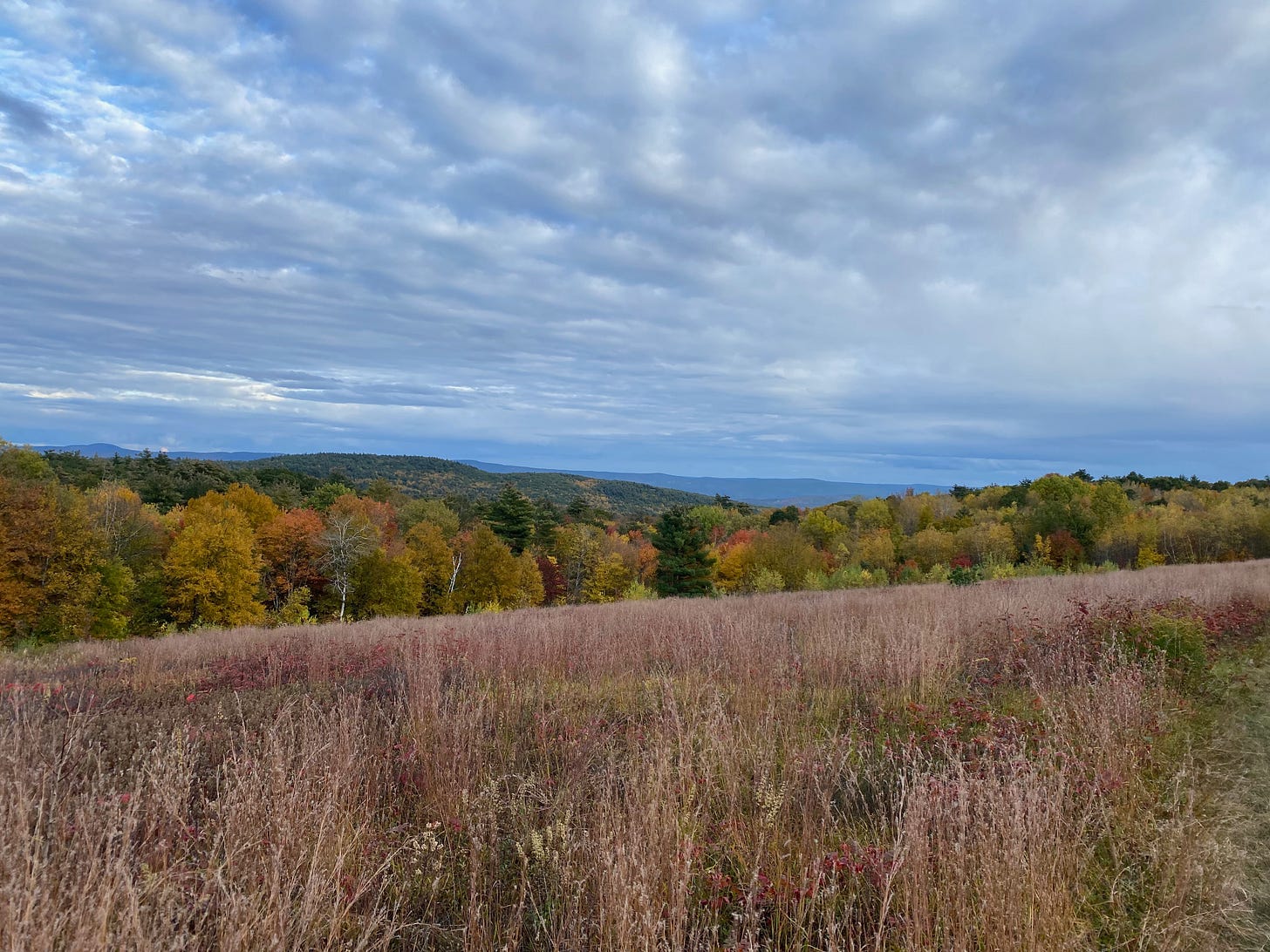Greetings, book and treat people!
I’ve been calling my reps every day for a little while now. I usually do it first thing after I wake up and leave a message. At first I was using this JVP tool; now I’m using the 5 Calls app. I don’t think my phone calls are going to influence the U.S. war machine. I’ve started thinking about this one minute (literally) as a daily prayer.
I’m not religious, but I do feel a deep connection to certain familiar Jewish prayers. Most prayers that I love are not asks, but acknowledgments. They are notes of gratitude: “Thank you for keeping us alive and bringing us to this season.” (Shehecheyanu) and “just / pay attention, then patch // a few words together and don’t try / to make them elaborate” (‘Praying’ by Mary Oliver).
So I call my reps every day as prayer of acknowledgment: of my own humanity and the humanity of the people whom my government has been determined to kill (often in my name) since its inception. I may keep doing it every day long after this moment. Prayer—in its endless forms—is one way to remain soft.
I’ve also been thinking a lot about books and art and their uses. Book people talk a lot about how all reading is political (yes). We talk a lot about how books can be a powerful educational tool (yes), how they can change the way you think (yes), and lead to direct action (yes). We talk about how educational/transformational reading without direct action is often an empty gesture (yes).
Something I don’t think we talk about enough is how books can also be a container, a way to hold grief, rage, despair. Reading can be a way to face the thing that feels too big to face. Reading is sometimes a way in, and sometimes a way through, but it can also be a way to simply be with. I’ve been struggling to articulate this idea for days, but it has something to do with reading as presence. Everything that comes before—the knowledge and history you bring with you into a text—matters. So does everything that comes after—what you do with the gifts of a text. But the moment with the text also matters. This is what I mean by reading as container: if you can’t stop thinking about something, sometimes it helps to not stop thinking about it. Reading is one way to look.
Can a brain be heartbroken? Can books be food? I don’t know. This week I finished my first book by Palestinian poet Mahmoud Darwish. He tangles words remarkably. His tangles are remarkably clear. Journal of an Ordinary Grief is one of the best books I’ve read this year.
The Book
The battles do not end, and the language remains on edge. These pages do not tell the whole story. They only set down the beginnings of a small voice that shook the rock a little. The homeland is distant and near, and in this everyday grief and everyday death the writing gets written, or tries to get written, so that this ordinary grief may stop accepting being acceptable.
Journal of an Ordinary Grief by Mahmoud Darwish, tr. Ibrahim Muhawi (Nonfiction, 1973, English translation 2010)
Darwish wrote this book of essays in 1973, though it feels like he could have written it yesterday, which is part of why it’s so utterly devastating. I’ve been walking around with this book inside my body for days, and I still don’t know how to write about it. It is fierce and sharp and utterly clear. Darwish’s anger and pain ring high and piercing, a clamor of bells. He writes with utter conviction about Palestinian liberation and names the ongoing atrocities committed by the state of Israel and Zionist settlers with unwavering, unflinching rage.
He also writes poetically. His sentences are often surprising; he tangles words together and builds the unexpected with them. He delves deep into the body of language to articulate complicated experiences, complicated history, a complicated understanding of identity. Metaphor is metaphor; metaphor isn’t metaphor. In one paragprah he cooly analyzes Zionist ideology and how it led to the occupation of his homeland and the murder of his people. In the next he writes about rocks and wind and wonders if he’ll ever be able to answer the question, “What is a homeland?”
It’s hard to explain how powerful this kind of writing is. It’s intimate, historical, analytical, emotional. Darwish doesn’t make distinctions between these different forms, these ways of writing about events almost too brutal to process. Every sentence is immediate. Every sentence is a poem. Every sentence is a declaration and an argument. Yet many sentences are also questions. He cuts to the heart and then cuts deeper. He speaks plainly and then repeats himself, in another way, from a different angle. I’ve never read writing quite like this, so sure and yet so agile, bursting with what is unsayable, untranslatable, and yet direct. “Justice, freedom, belonging, and worthiness are only proclaimed through resistance,” Darwish declares. Then, in another essay: “I want nothing from the world except to move the knife away from my throat.”
In one of my favorite essays, “The Homeland: Between Memory and History”, he writes:
When I chance upon pebbles that look like my heart, I transform them with my fingers on fire into words that put me in touch with the distant homeland. We then become a language that can turn into flesh.
I’m still working through the layers of this extraordinary passage. Throughout the book, but especially in this essay, Darwish circles around and around the idea and reality of homeland. It is not simple. But he does write simply—with clarity, with purpose—about the Zionist colonial project and the ways it hides, and then grows:
Jewish memory is one of the basic components of the claim to a right in Palestine. Yet it is incapable of admitting that others also possess the sense of memory. Israelis refuse to live side by side with Arab memory.
Later, he writes: “They have borne the griefs of history and released them in you, and it is demanded that you feel no sadness.” This cut right through me. Most of his sentences cut right through me. Maybe what I’m trying to say here is that Darwish doesn’t let his readers stand off to the side. He pulls us in and makes us look and he does so in a hundred ways—with facts, with poetry, with recollections of dreams, with stories and histories, with anger, with overflowing grief, with questions. He makes us look in the dialogues he writes (many of the essays are structured as conversations) with his childhood self, with an Israeli interrogator and prison guard, with the world itself. He makes us look by stating what is happening (in 1973, in 2023):
When we ask for justice from killers, then "world public opinion" must be understood metaphorically as long as the expression refers to media owned by individuals whose ideology and interests are linked. Why then should we accord it all this reverence? As for the true public opinion—human conscience—we do not see it or hear its voice because the official institution of "world public opinion" in the West has stifled and falsified it.
And then he makes us look by stating the same thing differently:
It is not true that the world has lost its memory. And it is also not true that we can make the world remember by pleasing it. The world wants to relax. It wants to gamble and sip whiskey.
Several of the sections in the essay “Journal of an Ordinary Grief” begin with a statement about something Darwish wants to do: “travel to Jerusalem,” “celebrate your birthday,” “rent an apartment,” “visit your mother on a feast day.” He then proceeds to explain how these things are impossible for him as a Palestinian living in Israel—sometimes literally impossible and sometimes emotionally impossible. In “Silence for the Sake of Gaza,” he writes about resistance and violence and traps in these metaphor/not metaphor sentences that kept making me lose my breath.
In the last two essays (“Going to the World” and “Going to the Arabic Sentence on May 15th”), which are both partial dialogues, Darwish is interested in the physicality of freedom, the locale of it. He writes about both the world and the Arabic sentence as places to go, and in doing so, explores the ways in which the world has failed Palestine, and what liberation might be found within the Arabic sentence. There’s an excellent translator’s note where Muhawi discusses this more explicitly—the way Darwish extends symbolism beyond its usual confines until it becomes something else. “Go to the Arabic sentence, and you will find self and homeland,” Darwish writes.
I could write an essay about every essay in this book. It’s an astonishing work of art. It’s a devastating work of art, because here we are, fifty years later, and the horrors that Darwish writes about have only morphed and settled. Reading these beautiful sentences, this work of imagination and song, this gorgeous, rageful witnessing—I don’t know how to finish this sentence. I am asking you to read this book, to let it wake up something in you. I am asking of myself the same thing. Maybe this is what we have to ask of ourselves, and each other, every day, again and again, forever—we let art enter us, we let it pierce us. How do we let that piercing back out? How do we let it move?
“We do not long for a wasteland, but for a paradise. We long to practice our humanity in a place of our own.”
The Beyond
Late Fall Eating
October is one of my favorite months for cooking, although I haven’t been doing much of it recently. I did wake up a few weeks ago in the mood for the familiarity of bread, its slow rhythm, its necessary waiting. So I made these extremely tasty chocolate tahini challah buns from Smitten Kitchen.
I also made a sparkling gingerbread cake from my favorite baking book (yes, I know you know, it’s this one). It’s simple and light and comforting and gingery.
I am forever grateful for Little Trúc for their amazing Thai curry pastes. I don’t get down to their delicious food truck in Easthampton that often, but I do cook with their products regularly. This week I made the simplest curry with tofu, potatoes, cauliflower, and their green curry paste. It fed me for days.
Recent Audiobooks
A Man of Two Faces by Viet Thanh Nguyen, read by the author: This is some of the best writing on American complicity and global imperialism I’ve read in a while. Nguyen’s understanding and analysis of cycles of colonial violence is brilliant, by which I mean it’s eviscerating and visceral. A memoir, and a thousand questions. Listening to it last week felt like being severed. It also felt essential.
Except for Palestine by Marc Lamont Hill & Mitchell Plitnick, read by Paul Boehmer: This is a short, extremely measured, and rational book about the failure of the American left to take a stand on Palestine, and the context behind it. The authors lay out their arguments (arguments for absolutely the most basic human rights for Palestinian people, nobody should ever have to make these arguments, but this is the world we live in) clearly and without fanfare and get into the weeds about international law. I found it helpful and clarifying, although the tone is somewhat dry and I prefer more emotional nonfiction.
Salt Houses by Hala Alyan, read by Leila Buck: I’m currently listening to this. It’s very good. It follows several generations of a Palestinian family displaced and forced into exile by the 1967 War. I loved The Arsonists’ City, and so far I love this for many of the same reasons: for the way Alyan writes into the small human moments that sometimes get lost in stories of violence, occupation, and dispossession.
Further Reading
I’ve recently read and loved two poetry collections by Palestine authors: Rifqa by Mohammed El-Kurd (some brief thoughts here) and The Earth in the Attic by Fady Joudah (some brief thoughts here). I’m currently reading The Philistine by Palestinian Canadian author Leila Marshy. It’s wonderful and very queer! Unfortunately, it’s hard to get a physical copy if you’re not in Canada, but you can buy the ebook on the publisher’s website. Originally I was planning to review all of these in today’s newsletter, but I’m still trying out this new one-long-book-review-per-newsletter thing. I do plan to write more about them in the future.
Here’s my current stack of library food, with many more books saved and on the way.
Things You May Find Hidden in My Ear by Mosab Abu Toha (poetry)
Why Did You Leave the Horse Alone? by Mahmoud Darwish, tr. Jeffrey Sacks (poetry)
Are You This? Or Are You This? by Madian Al Jazerah with Ellen Georgiou (memoir)
Freedom is a Constant Struggle by Angela Y. Davis (nonfiction)
A Map of Home by Randa Jarrar (fiction)
Enter Ghost by Isabella Hammad (fiction)
Light in Gaza edited by Jennifer Bing, Mike Merryman-Lotze, &Jehad Abusalim (mixed anthology)
The Beauty of Your Face by Sahar Mustafah (fiction)
Palestine Speaks edited by Cate Malek & Mateo Hoke (nonfiction)
Palestine by Joe Sacco (graphic nonfiction)
The Bookshelf
Around the Internet
On Book Riot, I made a list atypical monster books (aka no vampires), wrote about how much I love checking cookbooks out of the library, and rounded up some of my favorite indie presses with extensive BIPOC and queer catalogs. I wrote about some recent audiobooks featuring unexpected beginnings for AudioFile.
A Taste of the Commonplace
This week I searched through my commonplace book for passages tagged with ‘liberation’. Here’s some wisdom from We Will Not Cancel Us by adrienne maree brown, a book I return to often for its fierce and tender lessons:
But if we want to create a world in which conflict and trauma aren’t the center of our collective existence, we have to practice something new, ask different questions, access again our curiosity about each other as a species.
Queer Your Year
It’s time for the October raffle! This month’s prize is a copy of Family Meal by Bryan Washington, one of my favorite novels of the year, and some fun swag from Libro.fm: a mug and a beanie, just in time for fall coziness. Check out all the details here.
The winning prompts this month are: 15, 25, 32, 38, 39, 41, 43, and 48. You can submit your game card and find all the details here. You have until November 3 to submit. As always, don’t forget about the super fun prize packs! Everyone who submits a game card gets one, and they ship internationally.
And Beauty
First, some further feeding—art, words, actions, resources, etc. that have been feeding me (in all sorts of complicated and contradictory ways) this week:
“Doomsday Diaries” by Sarah Aziza (The Baffler)
“The View from My Window in Gaza” by Mosab Abu Toha (The New Yorker)
“As a Jewish Anti-Zionist, Here’s What I’ve Been Reading This Week” by Drew Burnett Gregory *Autostraddle): I haven’t read everything listed here, but what I have read has been very good.
Leslie Feinberg, warrior trans Jewish ancestor, always.
All the Walls Will Fall: 2023 Palestine Liberation Resource List (Palestinian Youth Movement): I can’t link to google docs without them showing up as attachments in your email, but you can access this comprehensive resource via the linktree here.
Decolonize Palestine Reading List: This is a comprehensive reading list divided into useful sections. The website is run by two Palestinians in Ramallah.
Hanif Abdurraqib is always brilliant. Like Ross Gay, he makes me interested in/curious about things I don’t really care about (all sorts of music, basketball). He’s been steadfast and smart on Instagram. I watched him speak yesterday on Millennials Are Killing Capitalism Live. I recommend it. I especially appreciate what he has to say about art and the way it makes long histories (of ongoing violence, of resistance) visible.
“Vol 4, Res 20: Gaza, Caring for Yourself, & Information Literacy” (Enthusiastic Encouragement & Dubious Advice): Patricia’s newsletter is always very good. You should subscribe.
“On learning to write again” by Adania Shibli: Alexander Chee shared this 2022 essay by Palestinian writer Adania Shibli in his recent newsletter. The prize ceremony for the Litprom award she recently won was cancelled. Censorship and punishment for speaking up about Palestine is absolutely wild right now.
“We Are Each Other’s Business” (Reads & Reveries Newsletter): There are a lot of resource collections going around; this is one I especially appreciated. It has some UK-specific actions, but there’s plenty for others, too.
If you’re local to Western MA, this is very sweet. This, too, is sweetness.
As always, a little bit of beauty to send you on your way: I took a long walk through the shimmering, windswept, sunset-hued fall hills on Sunday. Sometimes I don’t know how to hold so much beauty alongside so much devastation. So I walk and I practice.
Catch you next week, bookish friends! As always, if you want to support my work financially, you can subscribe here.








I'm in a season of sifting through my religious beliefs and practices and deciding what to keep or toss, and I really appreciate your expansive definition of prayer. Prayer is one of those things I'd like to keep, but don't feel like I can hold onto in its current form in my life.